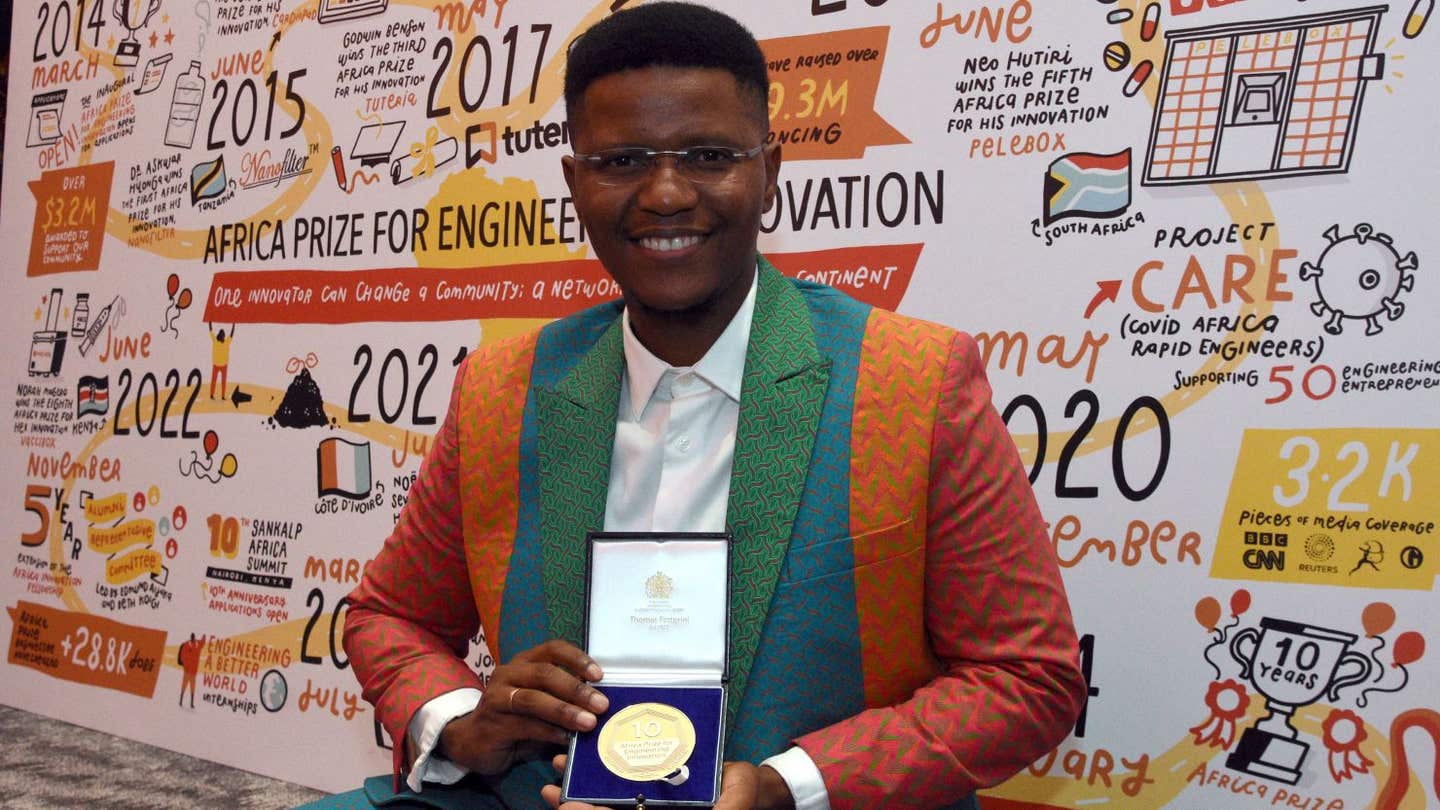Disrupting Healthcare: Innovator’s medicine-dispensing locker “Pelebox” wins prestigious prize
Pelebox, Neo Hutiri’s brainchild, addresses the critical issue of lengthy wait times for chronic medication.

South African entrepreneur Neo Hutiri is awarded the Royal Academy of Engineering's special medal to mark 10 years of the Africa Prize for Engineering Innovation. (CREDIT: The Royal Academy of Engineering)
South African entrepreneur Neo Hutiri has clinched a prestigious engineering award for his innovative creation, Pelebox, a system that is revolutionizing healthcare access in Africa. Hutiri was honored with £50,000 ($63,000) and a medal by the UK's Royal Academy of Engineering during a ceremony held in London.
The award was presented by Princess Anne, the sister of King Charles III. This accolade marked the 10-year anniversary of the Academy's Africa Prize for Engineering Innovation, celebrating entrepreneurs who have developed technologies to tackle local challenges across the continent.
In a special edition of the annual competition dedicated to its alumni, the Academy shortlisted 12 remarkable innovations from six different countries that had participated in its training program over the past decade.
Following a pitching session, a panel of six judges selected Neo Hutiri as the winner. Additionally, the standard iteration of the Africa Prize, scheduled for June, will feature four finalists competing for a £25,000 ($31,600) prize.
Related News
Pelebox, Neo Hutiri's brainchild, addresses the critical issue of lengthy wait times for chronic medication. The system consists of internet-enabled lockers pre-packed with medicine. Patients receive a code via SMS that allows them to access their prescribed medication, eliminating the need for time-consuming visits to healthcare facilities.
Hutiri initially won the Africa Prize in 2019 when he was running a pilot program for Pelebox. Since then, the startup has experienced substantial growth, and the innovative system is now operational in 123 healthcare facilities across South Africa, Namibia, and Botswana.
Hutiri expressed how winning the Africa Prize in 2019 had significantly boosted their progress, saying, "Winning the Africa prize helped open a lot of doors, gave us good recognition, changed a lot of 'noes' into 'yesses,' and ultimately gave us the audience we're looking for." He is hopeful that the 2024 prize money will act as a catalyst for the company's expansion, with the goal of expanding Pelebox's reach to six countries.
Pelebox aims to cut down the time that patients have to wait for chronic medication. Medicine is pre-packed and loaded into the box which a patient can open with a code sent via SMS. (CREDIT: James Oatway for the Royal Academy of Engineering)
The runners-up in this anniversary edition of the Africa Prize also received recognition and financial support. Nigerian entrepreneur Aisha Raheem was awarded £15,000 ($19,000) for her project, Farmz2U, a digital platform that helps farms plan their crops to prevent food waste. Samuel Njuguna from Kenya received the same amount for Chura Limited, a web-based, multi-network system aimed at improving mobile signal coverage and allowing users to switch between SIM cards regardless of carrier.
The Royal Academy of Engineering is set to invest more than £1 million ($1.2 million) in Africa Prize alumni through grants, prizes, and accelerator programs. The overarching goal, as articulated by prize judge Rebecca Enonchong, a Cameroonian technology entrepreneur, is to scale up engineering innovations and maximize their impact. Additionally, it serves as an opportunity to showcase African talent on a global stage.
Pelebox, Neo Hutiri's brainchild, addresses the critical issue of lengthy wait times for chronic medication. (CREDIT: africaprize.org.uk)
Enonchong pointed out the importance of diversifying the geographical representation of the prize's winners, stating, "If you look at the landscape of innovation on the African continent, you'll see South Africa, Kenya, Nigeria, and Egypt getting the most amount of funding and generally the most amount of attention for the founders.
That's not necessarily where all the innovation comes from. It just means that they have stronger, bigger, more developed ecosystems." Enonchong emphasized the significance of highlighting innovators and solutions from all corners of the continent, even in small towns and villages.
Since its inception in 2014, the Africa Prize for Engineering Innovation has provided support to more than 140 entrepreneurs from 23 African countries. Participants benefit from business training programs, engineering mentorship, communications support, and pitching opportunities. Notably, alumni from the prize have collectively raised over $39 million in finance and have introduced more than 470 products and services to the global market.
The Africa Prize for Engineering Innovation serves as a beacon of hope for African startups, addressing critical issues and propelling them onto the global stage. With the invaluable recognition and support it offers, African entrepreneurs like Neo Hutiri are empowered to continue developing groundbreaking solutions to the continent's pressing challenges. This celebration of innovation highlights that Africa is a rich source of talent, creativity, and solutions that can have a profound impact on the world.
Note: Materials provided above by The Brighter Side of News. Content may be edited for style and length.
Like these kind of feel good stories? Get the Brighter Side of News' newsletter.
Joshua Shavit
Science & Technology Writer | AI and Robotics Reporter
Joshua Shavit is a Los Angeles-based science and technology writer with a passion for exploring the breakthroughs shaping the future. As a contributor to The Brighter Side of News, he focuses on positive and transformative advancements in AI, technology, physics, engineering, robotics and space science. Joshua is currently working towards a Bachelor of Science in Business Administration at the University of California, Berkeley. He combines his academic background with a talent for storytelling, making complex scientific discoveries engaging and accessible. His work highlights the innovators behind the ideas, bringing readers closer to the people driving progress.



